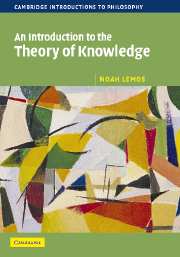Book contents
- Frontmatter
- Contents
- Preface
- 1 Knowledge, truth, and justification
- 2 The traditional analysis and the Gettier problem
- 3 Foundationalism
- 4 The coherence theory of justification
- 5 Reliabilism and virtue epistemology
- 6 Internalism, externalism, and epistemic circularity
- 7 Skepticism
- 8 The problem of the criterion
- 9 The a priori
- 10 Naturalized epistemology
- Select bibliography
- Index
6 - Internalism, externalism, and epistemic circularity
- Frontmatter
- Contents
- Preface
- 1 Knowledge, truth, and justification
- 2 The traditional analysis and the Gettier problem
- 3 Foundationalism
- 4 The coherence theory of justification
- 5 Reliabilism and virtue epistemology
- 6 Internalism, externalism, and epistemic circularity
- 7 Skepticism
- 8 The problem of the criterion
- 9 The a priori
- 10 Naturalized epistemology
- Select bibliography
- Index
Summary
In the last chapter, we examined a reliability theory of justification. In this chapter, we will continue to explore issues concerning justification, knowledge, and reliability. In the first section, we will focus on the debate between “internalism” and “externalism,” two very general views about the nature of epistemic justification. In the last two sections, we shall consider some issues concerning how we know that any of our ways of forming beliefs, such as perception and memory, are reliable. Suppose, for example, that the only way to support the reliability of memory involves using memory. Would that way of supporting the reliability of memory be epistemically unacceptable? Would it prevent us from knowing that it is reliable? We shall consider some different answers to such questions. We shall focus mainly on the views of William Alston and Ernest Sosa.
Internalism and externalism
In the previous chapters, we considered a variety of theories about epistemic justification, including different forms of foundationalism, coherentism, and reliabilism. In the past twenty years, many philosophers have classified these theories of epistemic justification as either internalist or externalist. Internalism and externalism are general views about what is relevant to epistemic justification. Assessing the debate between internalists and externalists is difficult because different writers often use the terms “internalism” and “externalism” to mean different things. Still, it is worth considering some of the main issues that arise in the debate.
Let's consider one common way of drawing the distinction between internalism and externalism.
- Type
- Chapter
- Information
- An Introduction to the Theory of Knowledge , pp. 108 - 130Publisher: Cambridge University PressPrint publication year: 2007



